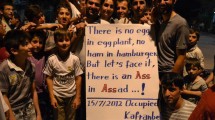Abstract
Based on the proposition that human beings are humor beings, this article probes into Iranian society through the lens of humor. It also strives to open a window to Iranian perspectives on America. Persian online jokes as the mainstream of Iranian humor about America are focused on. The qualitative analysis of several stereotypes of these jokes offers insights into Iranian viewpoints on domestic issues as well as American society. The paper discusses three categories of jokes: “double-barrel shotgun,” “American Dream,” and “rattlesnake.” They are elaborated on against a backdrop of recent developments in Iran, Iran-US geopolitical tensions, and the social functions of humor. Iranian jokes about America chiefly serve as a secure, legitimate venue for Iranians to express their domestic concerns, permitting a discourse of resistance and awareness under the façade of humor. Such humor also reveals the tacit, socio-cultural presuppositions Iranians hold about American society. Thus, the paper can potentially shed light on how Iranian society considers its American counterpart regardless of the media propaganda and the conflicts between the respective governments. This is a notably under-explored area of research to which this article endeavors to contribute new insights.
Similar content being viewed by others
References
Abedinifard, Mostafa. 2016. “Structural Functions of the Targeted Joke: Iranian Modernity and the Qazvini Man as Predatory Homosexual.” Humor: International Journal of Humor Research 29(3): 337-357.
Ahmadian, Hassan. 2021. “Iran and the New Geopolitics of the Middle East: In Search of Equilibrium.” Journal of Balkan and Near Eastern Studies 23 (3): 458-472.
Attardo, Salvatore. 2001. Humorous Texts: A Semantic and Pragmatic Analysis. Berlin, NY: Mouton de Gruyter.
Attardo, Salvatore. 2020. The Linguistics of Humor: An Introduction. Oxford: Oxford University Press.
Azadi, Pooya, Matin Mirramezani, and Mohsen B. Mesgaran. 2020. “Migration and Brain Drain from Iran”. Stanford Iran 2040 Project, Stanford University, Working Paper 9: 1-30.
Barzegar, Kayhan. 2014. “Iran-US Relations in the Light of the Nuclear Negotiations.” The International Spectator: Italian Journal of International Affairs 49(3):1-7.
Bauer, Martin W., and Bas Aarts. 2000. “Corpus Instruction: A Principle for Qualitative Data Collection” in Qualitative Researching with Text, Image and Sound: A Practical Handbook for Social Research, edited by M. W. Bauer and G. Gaskell. London: SAGE Publications Ltd.
Berger, Arthur Asa. 1976. “Laughing Matter: Anatomy of the Joke.” Journal of Communication 26 (3): 113-115.
Burkhart, Ross E. 2004. “Threshold Effect.” Pp. 1125 in The SAGE Encyclopedia of Social Science Research Methods, edited by M. S. Lewis-Beck, A. Bryman, and T. F. Liao. Thousand Oaks, CA: SAGE Publications, Inc.
Demjén, Zsofia. 2018. “Complexity Theory and Conversational Humour: Tracing the Birth and Decline of a Running Joke in an Online Cancer Support Community.” Journal of Pragmatics 133: 93-104.
Deneire, Marc. 1995. “Humor and Foreign Language Teaching.” Humor: International Journal of Humor Research 8: 285-298.
Foucault, Michel. 1980. The History of Sexuality, vol. 1. New York: Vintage.
Gee, James P. 2015. “Discourse, Small d, Big D.” in The International Encyclopedia of Language and Social Interaction, edited by K. Tracy, C. Ilie, and T. Sandel. New York: John Wiley. https://doi.org/10.1002/9781118611463.WBIELSI016.
Hall, Edward T. 1959/1973. The Silent Language. New York, NY: Anchor Press/Doubleday.
Heidari-Shahreza, Mohammad Ali. 2017. “A Rhetorical Analysis of Humor Styles and Techniques Used in Persian Stand-up Comedy.” Humor: International Journal of Humor Research 30 (4): 359-381.
Heidari-Shahreza, Mohammad Ali. 2018a. “A Proficiency-based Analysis of EFL Learners’ Humorous Language Play.” International Journal of Applied Linguistics 28(3): 406-423.
Heidari-Shahreza, Mohammad Ali. 2018b. “A Cross-sectional Analysis of Teacher-initiated Verbal Humor and Ludic Language Play in an English as a Foreign Language (EFL) Context.” Cogent Education 5 (1): 1-20.
Heidari-Shahreza, Mohammad Ali. 2019. “A Sociolinguistic Analysis of Gender in Persian Verbal Humor: The Case of Online Jokes.” Gender Issues 36 (1), 46-66.
Kotthoff, Helga. 2006. “Gender and Humor: The State of the Art.” Journal of Pragmatics 38: 4-25.
Mahdavi, Pardis. 2007. “Passionate Uprisings: Young People, Sexuality and Politics in Post-revolutionary Iran.” Culture, Health and Sexuality 9 (5): 445-457.
Martin, Rod A., and Thomas E. Ford. 2018. The Psychology of Humor: An Integrative Approach (2nd Edition). Amsterdam: Elsevier Academic Press.
Martin, Rod A., Patricia Puhlik-Doris, Gwen Larsen, Jeanette Gray, and Kelly Weir. 2003. “Individual Differences in Uses of Humor and their Relation to Psychological Well-being: Development of the Humor Styles Questionnaire.” Journal of Research in Personality 37: 48-75.
McGraw, A. Peter, and Caleb Warren. 2010. “Benign Violations: Making Immoral Behavior Funny.” Psychological Science 21(8):1141-1149.
Mostofi, Nilou. 2003. “WHO WE ARE: The Perplexity of Iranian-American Identity.” The Sociological Quarterly 44 (4): 681-703.
Pak-Shiraz, Nacim. 2013. “Imagining the Diaspora in the New Millennium Comedies of Iranian Cinema.” Iranian Studies 46(2): 165-184.
Pomerantz, Anne, and Nancy D. Bell. 2011. “Humor as Safe House in the Foreign Language Classroom.” The Modern Language Journal 95:148-161.
Sadeghi, Elaheh, and Mohammad Ali Heidari-Shahreza. 2016. “Post-punch Line Humor Booster: A Neglected Component of Persian Online Jokes”. Journal of Applied Linguistics and Language Research 3 (7): 309-318.
Sanati, Reza. 2014. “Beyond the Domestic Picture: The Geopolitical Factors that have Formed Contemporary Iran–US Relations.” Global Change, Peace and Security 26(2): 125-140.
Weaver, Simon. 2010. “The Reverse Discourse and Resistance of Asian Comedians in the West.” Comedy Studies 1(2):149-157.
Zajdman, Anat. 1995. “Humorous Face-threatening Acts: Humor as Strategy.” Journal of Pragmatics 23(3): 325-339.
Ziv, Avner. 2010. “The Social Function of Humor in Interpersonal Relationships.” Society 47: 11-18.
Acknowledgements
I would like to thank Arthur Asa Berger, Professor Emeritus of Broadcast and Electronic Communication Arts at San Francisco State University, for his encouragement and feedback on an earlier version of this manuscript. My sincere gratitude also goes to the peer reviewers and Professor Daniel Gordon, the Co-Editor-in-Chief, for his constructive comments and suggestions.
Author information
Authors and Affiliations
Corresponding author
Additional information
Publisher’s Note
Springer Nature remains neutral with regard to jurisdictional claims in published maps and institutional affiliations.
Rights and permissions
About this article
Cite this article
Heidari-Shahreza, .A. When a Nation Breathes Through Humor: A Sociolinguistic Perspective on Iranian Jokes About America. Soc 58, 301–307 (2021). https://doi.org/10.1007/s12115-021-00608-5
Accepted:
Published:
Issue Date:
DOI: https://doi.org/10.1007/s12115-021-00608-5




